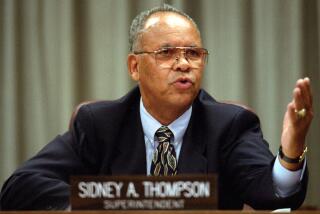Griffin Bell dies at 90; former attorney general and federal judge was at center of racial disputes
Griffin B. Bell, a Southern judge who earned both enmity and praise during the civil rights era -- and later served as a reform-minded attorney general under President Carter -- died Monday morning at an Atlanta hospital. He was 90.
Bell died of complications from pancreatic cancer, said Les Zuke, a spokesman for King & Spalding, the Atlanta-based law firm that Bell helped build into a national powerhouse.
Bell will be best remembered for his life in government, first as a justice in the U.S. 5th Circuit Court of Appeals in the Deep South where, as a self-described “moderate,” he issued decisions that variously delighted and disappointed Americans on both sides of the integration battles of the 1960s; and later, as the head of a U.S. Justice Department that had lost much of the American public’s trust after the Watergate scandal.
The style Bell brought to the Justice Department in 1977 was not that of a fiery reformer but of a pragmatic lawyer looking for solutions amenable to all parties -- a style that mirrored his work on the federal bench.
“He was a very practical man,” said Jack Bass, a professor of history at the Citadel in South Carolina who has written extensively about federal judges during the Civil Rights era. “And he understood the political realities of his time.”
Former President Carter said in a statement that he was “deeply saddened” by the death of an advisor he had known since childhood.
“A trusted and enduring public figure, Griffin’s integrity, professionalism, and charm were greatly valued across party lines and presidential administrations,” Carter said.
Bell was born Oct. 31, 1918, in Americus, a few miles from Carter’s hometown of Plains, in the flat farmland of South Georgia. He served in the Army during World War II; and at Mercer University in Macon, Ga., he helped start the school’s first law review. He joined King & Spalding in 1953.
His serious entry into Georgia politics came in 1959, when he was named chief of staff to S. Ernest Vandiver, Georgia’s staunch segregationist governor. That year, a federal judge ordered the integration of Atlanta’s public schools. Bell quietly met with black leaders, asking them to slow down their legal push for integration. Publicly, he created a commission that attempted to steer the white public toward an attenuated form of integration that would be the rule in Georgia through most of the 1960s.
Bell would later say that he had trouble squaring segregation with his Christian faith. In 1960, he worked hard to deliver Georgia for Democrat John F. Kennedy.
Kennedy rewarded him with an appointment to the federal appeals bench the next year.
In his 15 years on the 5th Circuit -- which at the time covered Florida, Georgia, Alabama, Mississippi, Louisiana and Texas -- he had a hand in more than 3,000 cases, including 141 involving school desegregation.
He was a strong believer in adherence to the Constitution and the rule of law, which meant he often showed little sympathy for white school districts that dragged their feet on desegregation orders.
But he also cherished individual liberties and, as a practical matter, worried about the erosion of neighborhood-centered schools, making him skeptical of busing.
He supported reforming Southern juries to add more black members. But he also upheld the Georgia Legislature’s 1966 attempt to block Julian Bond, a black activist who won a state congressional race, from taking his place among them in the Capitol.
In 1972, he helped broker a deal between blacks and whites that brought a more comprehensive legal desegregation of the Atlanta public schools.
Bell’s style was more prosaic than that of his fellow judges on the 5th Circuit: His prose did not soar like that of New Orleans’ John Minor Wisdom; his figure was not as imposing as that of Alabama native Frank Minis Johnson. But he was seen by many as a crucial moderate voice who helped find judicial common ground during one of the most tumultuous periods in American history.
“He synthesized the court in support of civil rights,” said Terry Adamson, who clerked for Bell and became a Justice Department spokesman. “That was not unimportant.”
At Carter’s Justice Department, Bell supported the appointment of a black solicitor general, Wade McCree, and a black assistant attorney general for civil rights, Drew S. Days III.
The number of blacks and women appointed to the federal bench increased dramatically under Bell.
Adamson credits him with bringing needed reform to the CIA and FBI, helping insulate the Justice Department from political pressure from the White House and pushing for passage of the Foreign Intelligence Surveillance Act, which, among other things, sets guidelines for domestic surveillance of U.S. citizens.
In 1979, Bell encountered criticism from congressional Republicans who said he had failed to give enough autonomy to a special counsel appointed to head a probe into potential money-laundering by the Carter family peanut business.
Bell eventually conceded and gave the special counsel more independence. The special counsel cleared Carter of wrongdoing.
Bell’s moderate-to-conservative views on issues including national security -- as well as his easy, drawling Southern demeanor -- helped him win over a number of Republicans in the long run, and after he left the federal government in 1979, he worked for and supported a number of them.
He served as the lawyer for George H.W. Bush during the Iran-Contra investigation, supported the failed Supreme Court nomination of conservative Robert Bork and endorsed Sen. John McCain in the 2008 presidential election.
He is survived by his wife, Nancy Bell, of Americus, Ga. His first wife, Mary Bell, died in 2000. He is also survived by a son, Griffin Bell Jr., and daughter-in-law, Glenda Bell, both of Atlanta; a grandson, Griffin Bell III of Decatur, Ga., and a number of great-grandchildren.
More to Read
Start your day right
Sign up for Essential California for the L.A. Times biggest news, features and recommendations in your inbox six days a week.
You may occasionally receive promotional content from the Los Angeles Times.






